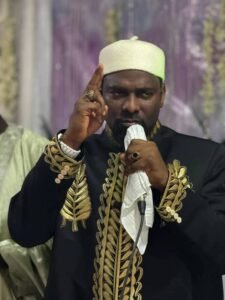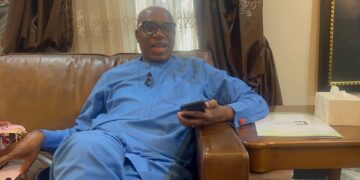
Renowned Islamic scholar, Sheikh Talhat Abdullahi Salaty, popularly known as Maolana Naqeebul Ashraf, has called out young Islamic clerics for their controversial conduct at the recent 7-day Fidau prayer held for Alhaja Halimah Shadiya Anifowoshe, the late mother of Fuji icon, King Wasiu Ayinde Marshall (K1 De Ultimate).
In a viral video, Naqeebul Ashraf questioned the intentions of several young clerics who claimed to have attended the event to honor the deceased. He criticized their uninvited presence, asking whether Wasiu Ayinde would reciprocate by attending their mothers’ burials if invited.
The cleric also defended the Fuji legend over his controversial statement, “Awon Alfa Won Ga’nu Sibi” (loosely translated as “These Alfas are after food”), which had gone viral a day before the prayer ceremony in Ijebu Ode, Ogun State. According to Naqeebul Ashraf, the remark, though widely criticized, reflected the questionable actions of some of the young Alfas present at the event.
“Many of these young clerics are known for gate-crashing events they were not invited to, especially ones attended by dignitaries and wealthy individuals,” Naqeebul Ashraf stated. “At such gatherings, they discreetly collect contact information from the attendees, showcasing dubious and fraudulent behavior.”
He went further to lament the moral decay among some of the younger Islamic clerics, alleging that they indulge in activities such as smoking Indian hemp and engaging in other acts unbecoming of their religious roles. “These behaviors are not only disgraceful but also tarnish the image of Islamic scholarship,” he added.
The Fidau prayer, which was attended by high-profile individuals and notable Islamic clerics, became a subject of public discourse following Wasiu Ayinde’s remark. Naqeebul Ashraf’s criticism sheds light on the increasing scrutiny of young Islamic scholars’ conduct at religious and social events.
While urging clerics to uphold the dignity and sanctity of their calling, Naqeebul Ashraf advised the public to exercise caution in dealing with individuals who exploit religious platforms for personal gain. He called for a return to the core values of humility, sincerity, and piety that define the true essence of Islamic leadership.
The incident continues to spark debates within religious and social circles about the evolving roles and expectations of Islamic scholars in contemporary society.

















